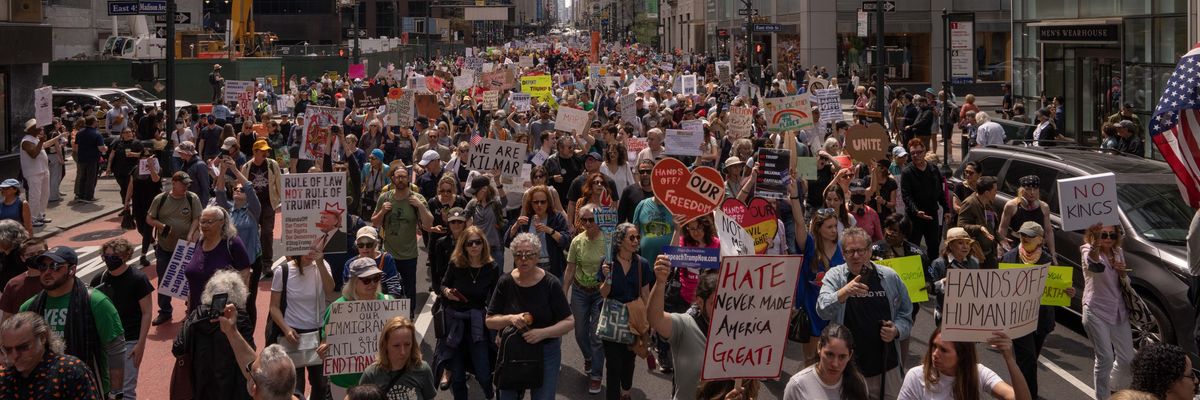Two weeks after millions of people attended "Hands Off" protests across the United States, expressing outrage over President Donald Trump's unlawful deportation operation, abandonment of due process for hundreds of migrants, and spending cuts in the interest of enriching the wealthiest Americans, organizers with the "50501" movement called for 11 million people to take to the streets again on Saturday—and early reports suggested the public remains mobilized against the administration.
With Trump intensifying his attacks on federal workers, the environment, freedom of speech, and migrants in recent weeks, organizers said hundreds of events were planned on Saturday—and the protests reflected the wide array of policies that have left Americans angry and fearful about who could be victimized next by the administration.
Signs at a rally outside the Ohio Statehouse in Columbus read, "Ban the fascists, not the books" and "Trump and Vance are traitors," referring to Vice President JD Vance.
Karen Kasler of the Statehouse News Bureau reported the Columbus protest drew the "largest crowd I've seen here since the protest following the U.S. Supreme Court's Dobbs decision overturning the right to abortion in 2022."
Major gatherings also took place in Chicago, New York, and Washington, D.C.
Hunter Dunn, a spokesperson for the 50501 movement—which grew out of a post on Reddit with a call for "50 protests in 50 states on one day"—toldThe Washington Post that the demonstrations are the actions of a "pro-democracy, pro-Constitution, anti-executive overreach, nonviolent grassroots movement."
In addition to protests, organizers called for participants to take part in actions to serve their communities, such as food banks and neighborhood cleanups.
"It's all about actions that support your community against the Trump administration—strengthening your community so that they can weather these assaults on democracy," Dunn toldNPR.
The expulsion of Maryland resident Kilmar Abrego Garcia—a migrant sent by the administration to a super-max prison in El Salvador under a deal with President Nayib Bukele—was a focus for many protesters, following a week of news about his situation. Administration officials have repeatedly claimed Abrego Garcia is a "convicted gang member" and have refused to return him to the U.S. despite a Supreme Court order.
"We are not angry people, we are loving people, but that situation is enraging to us," North Carolina resident Chris Gilbert told The Washington Post at a rally in the nation's capital. "We felt called to come up here to put pressure on the Trump administration. He runs for law and order but then his actions are the opposite."
Organizers say that as Trump has broadened his attacks—overseeing a deportation campaign in which international students have been abducted by plainclothes immigration agents, some wearing masks, in unmarked vehicles—the 50501 movement has grown considerably since its first call to action in early February.
The movement's first day of protests on February 5 included about 80 events in 88 cities, and Dunn said organizers were expecting close to 1,000 events Saturday.

